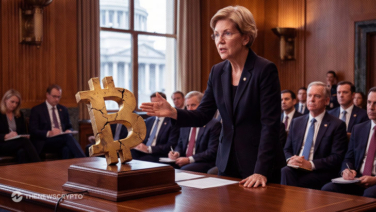- CAMT may tax unrealized crypto gains.
- Senators seek urgent Treasury guidance.
- Rule may discourage crypto adoption by firms.
Republican Senators Cynthia Lummis (WY) and Bernie Moreno (OH) are sounding the alarm on potential tax pitfalls facing companies holding digital assets. In a recent letter to Treasury Secretary Scott Bessent, the two lawmakers urged the department to clarify how the Corporate Alternative Minimum Tax (CAMT) applies to unrealized gains from digital assets like Bitcoin.
The senators argue that the combination of CAMT and new Financial Accounting Standards Board (FASB) rules could create unfair tax liabilities. Under the Inflation Reduction Act passed in 2022, the CAMT applies a 15% minimum tax to corporations with more than $1 billion in adjusted financial income over three years.
However, updated FASB guidance now requires corporations to mark their digital assets to market, meaning they must report holdings based on current prices, not original purchase costs. While this was initially welcomed by companies like MicroStrategy, it’s now creating new challenges.
Crypto Profits, Tax Problems
Lummis and Moreno warn that firms could end up paying taxes on gains they haven’t realized. “This could force companies to sell digital assets just to cover tax bills,” they wrote, emphasizing how it may discourage U.S. firms from holding or investing in cryptocurrencies altogether.
Previously, Bitcoin and similar assets were considered intangible and subject to impairment if prices fell. But under the updated rules, firms must now reflect the current market value, creating potential tax obligations if prices rise, even without a sale.
They also point out that the CAMT was never originally intended to apply to digital assets in this manner. In fact, at the time of its passage, few considered its implications for crypto, a person familiar with the matter said. Now, combined with the FASB’s updated treatment, companies holding appreciated digital assets are inadvertently being penalized.
The senators highlight that similar exemptions already exist for unrealized stock gains at companies like Berkshire Hathaway and argue that digital assets deserve the same treatment. They are urging the Treasury to provide interim guidance to avoid what they describe as “a harmful and unintended tax policy.”
“By issuing updated rules,” they noted, “the Treasury can prevent policies that distort markets and penalize innovation.” Without swift clarification, companies may be forced to adjust their digital asset strategies or reduce holdings entirely to avoid disproportionate tax burdens.
The Treasury has yet to comment on the letter or clarify the issue.
Highlighted Crypto News Today:








